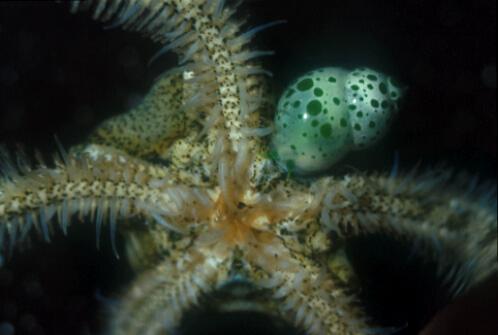Ophiuroidea is one of the major zoological benthos groups, not so much for its biomass, but for its ecological success. This biological wealth, both by number of species and number of individuals of the populations was caused by:
- A small size and mobility
- Food variety
- Large capacity for regeneration
The so hackneyed popular saying "size doesn't matter" can be applied to the ophiuroids. Their small size helps them find shelter and go undetected for potential predators. This is the case of those who live associated to Porifera, which, taking advantage of the currents generated by the choanocytes, just have to wait for the food to come. In other cases, the moving stars are those who are looking for prey or fleeing from predators - their winding movements let them make a difference from their potential competitors.
They occupy different niches within the benthic ecosystem, from predators to scavengers and detritivorous, passing through suspensivorous (like those living on gorgonians and collecting suspension particles with ambulacral feet or with mucus cords located between the brachial spines). But possibly the most successful groups are the opportunists, cause they adapt to the food offer of the moment.
Its high degree of interaction with other zoological groups is not exclusively trophic; from epibiosis with foraminifera, Porifera, Cnidaria and Entoprocta up to the higher degree of interaction of commensalism with hydrozoans . And also there are always threatening parasites such as gastropods, copepods, barnacles or nematodes, but due to the great capacity of regeneration of the ophiuroids, the lives of infected specimens do not seem to be in danger.

Eulimid snail on Ophiothrix sp. Photo: Anders Warén
The brittle stars are capable of losing some of their arms not only when they are literally attacked by a predator, but capable of doing it motu proprio, or even part of the disc, leaving stunned the attacker and getting some vital seconds to escape.
All this potential has resulted in having a wide distribution in all seas and oceans of the world, from shallow waters to abyssal zones, becoming in some regions one of the dominant groups in the benthos.
